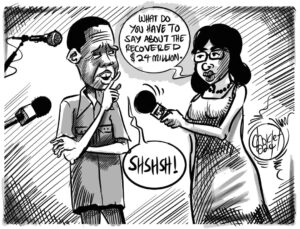TRANSPARENCY International Zambia (TIZ) says the University of Zambia (UNZA) should not trivialize audits like the one conducted by the Auditor General if the institution is to be brought back in the league of eminent, leading African universities.
And TIZ says UNZA management needs to improve its adherence to financial regulations.
Meanwhile, TIZ says the Ministry of Higher Education should, as a matter of priority, ensure that substantive councils are appointed for the three public universities; UNZA, CBU and Mulungushi University.
Commenting on an audit which was carried out by the Auditor General for the year ended 2018 in a statement sent to News Diggers, TIZ president Rueben Lifuka said it was uncalled for that UNZA management had labeled media reports arising from the audit as malicious instead of finding ways to fix the short comings highlighted in the report.
“Transparency International Zambia, has read with dismay and great concern some of the findings of the Auditor General, submitted in the management letter to the University of Zambia, following the statutory audit conducted for the year ended 31st December 2018…First and foremost, we want to welcome this development where the Auditor General has undertaken a statutory audit of the University of Zambia, which is a public institution and one which is a beneficiary of public funds appropriated through the National Budget, among several of its funding sources. We have no cause to question or label as malicious the audit conducted as this is in conformity with the provisions of the Constitution, as well as the Public Audit Act and the Public Finance Management Act No 1 of 2018. We would in fact recommend that a similar audit is conducted for the Copperbelt University. It is our understanding that the 2018 Audit has since been concluded and what was reported by the media is the management letter in which the Auditor General shared his findings on matters his office came across during the course of conducting this exercise,” Lifuka stated.
“The management letter is important in this context as the Auditor General is essentially communicating to the owners of the institution- the Zambian people including the University Council and the Government of the Republic of Zambia; the extent of the performance of management with regard to control and compliance functions. The management letter aptly points to areas where controls are weak or non existent as well as the failures in compliance with both internal and external regulations. The Auditor General points to the risks which may arise if necessary remedial actions are not taken. It is our understanding that the Auditor General followed standard procedures and provided management an opportunity to respond to the findings and the management letter reflects these responses. It is therefore uncalled for to label the media reports as malicious as the UNZA Head of Public Relations has tried to do. Instead of taking on a defensive position, it is our expectation that both Management and the University Council will reflect on these findings and remedy the areas of weakness and shortcomings, where this is possible.”
He asked UNZA management not to trivialize the report if they were serious about restoring the institution.
“UNZA needs a medium to long term turnaround strategy and we would like Government and cooperating partners to consider supporting this. However, it is our considered view that the 2018 statutory audit should urgently be supplemented by a detailed evaluation of systems and procedures at the institution in order to identify all areas of significant systems weaknesses and propose remedial actions. UNZA is an important institution and we dare to say, a national asset that should bring pride to all Zambians but certainly not in its current state. This institution has been limping in its operations for a while and it is time that bold decisions are taken to bring it back into the league of eminent and leading African universities. This is only possible if audits like the one conducted by the Auditor General, are not trivialised but taken seriously by all and especially UNZA Management,” he stated.
And Lifuka said it was unacceptable to read about UNZA management’s failure to adhere to financial regulations.
“UNZA Management, in the context of the Management letter, has a number of areas of improvement in the discharge of its functions. It is unacceptable to read of inadequate adherence to UNZA Financial Regulations with incidents cited of unretired accountable imprest, inadequately supported payments, failure to prepare bank reconciliations, lack of activity reports etc. It is even further worrying that inadequacies in procurement management were identified and specifically one would not expect that UNZA through the School of Education would purchase a property in 2012 to serve as a Computer laboratory and 7 years later, this remains unused. Other procurement shortcomings include the procurement of an air conditioning unit at the School of Medicine which was only delivered 11 months later,” Lifuka stated.
“Going forward, we do recommend that the National Assembly of Zambia and particularly the Public Accounts Committee should take keen interest in the happenings at UNZA as outlined in the audited financial statement for 2018. We would like to see greater scrutiny and accountability in public institutions and UNZA should not be an exception. We further recommend that the Ministry of Higher Education and the University Council should publicly communicate the policy decisions made to address the findings of this audit and previous audits.”
Meanwhile, Lifuka said the three public universities needed substantive councils which could improve the manner in which they were being run.
“The management letter, in our view, points to a serious lack of oversight from the University Council as a governing body in the administration of the institution. It is our expectation that the University Council should have identified the absence of critical institutional policies like the Assets Management Policy, ICT Policy and Credit Management Policy, which have been highlighted by the Auditor General. The Council should have also noted the various inadequacies in internal controls and lack of compliance. For instance, it does not bode well for UNZA to have had no Annual Reports for the years 2016-2018 and no audited financial statements for 2016, 2017 and 2018. These are accountability documents which the public should ideally access in order to assess the performance of this public institution,” he stated.
“ The University Council or in this case the Caretaker Committee, owes a duty of care to UNZA employees and they should have ensured that the social security of employees is guaranteed through regular payments of statutory dues for NAPSA. The pension and other social protection schemes that should help retirees who have served the university diligently for many years, should not be compromised. The Council should have taken keen interest in ensuring that there is prudent utilisation of public resources and that these are not only going to satisfy the service conditions of a few. The management letter points to several issues which the governing body should have picked up in the fulfilment of its mandate. It is in this regard that we express our concern that UNZA has since 2016 been operating with a Caretaker Committee as opposed to a full Council. The Ministry of Higher Education should as a matter of priority ensure that substantive councils are appointed for the three public universities- UNZA, CBU and Mulungushi University. A substantive Council should be mandated to strengthen the oversight of UNZA management.”
Lifuka insisted that unless UNZA’s historical challenges were addressed, management’s inadequacies would continue being amplified.
“The findings in the management letter confirm what is definitely common knowledge that the running of public universities and especially UNZA and the Copperbelt University, remains sub optimal and there is need for urgent remedial action. We are aware that this is not the first time that some of the inadequacies in operations, control and compliance have been pointed out and we recall that in April 1997 the MMD Government appointed a Commission of Inquiry led by Justice Bobby Bwalya, and 10 years later, in 2007, the MMD Government under the late President Levy Mwanawasa convened a consultative forum for all public universities to identify issues of concern. In September 2012, the Parliamentary portfolio Committee on Education, Science and Technology, presented a report to the House which addressed pertinent issues affecting public universities,” stated Lifuka.
“Clearly, the issues are common cause and what is missing is tangible and long term actions from all relevant authorities, particularly the Ministry of Higher Education and the University Council. UNZA is saddled with a number of historical challenges and unless these are addressed urgently, the inadequacies of management will continue to be amplified. We are aware of the Cabinet Memo on Public Universities New Financing Strategy but this will remain as mere statement of intent if it is not backed with consistent actions including the release of funds particularly to address historical debts. While funding is important, it is our considered view that this is not sufficient in the absence of strong leadership, experienced and capable management, and robust systems and procedures.”












